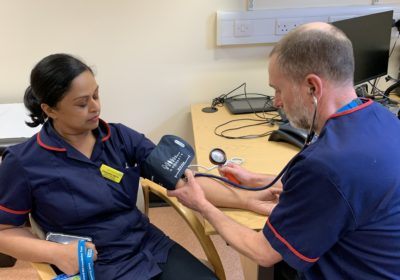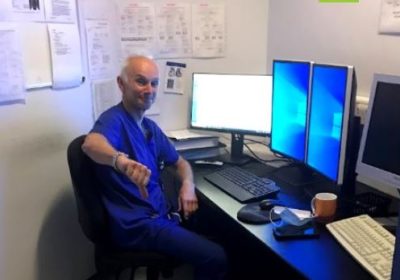The Care Quality Commission (CQC) carried out unannounced inspections at South Tyneside and Sunderland NHS Foundation Trust in response to concerns received about the safety and quality of the two core services.
The independent health and social care regulator’s inspection team visited South Tyneside District Hospital and Sunderland Royal Hospital in June 2022, then returned in August to look again at maternity services and medical wards, as well as the management and leadership of the trust under the key question of well-led.
 Sarah Dronsfield, CQC deputy director of operations in the north, said: “During our inspection of South Tyneside and Sunderland NHS Foundation Trust in June, we found concerns relating to patient safety in the two services we visited, particularly around the management of risk.
Sarah Dronsfield, CQC deputy director of operations in the north, said: “During our inspection of South Tyneside and Sunderland NHS Foundation Trust in June, we found concerns relating to patient safety in the two services we visited, particularly around the management of risk.
“We shared these concerns with the trust’s senior leadership team. The board then provided details of the immediate action that would be taken to address these concerns.
“However, during our well-led inspection in August, we carried out a second inspection of the same two services at Sunderland Royal Hospital and South Tyneside District Hospital to check whether the trust had addressed, embedded and sustained the improvements required following our previous inspection in June.
“During this visit, we found the trust had made some improvements but had not addressed all of the areas of concern, which resulted in continued breaches of several regulations. We also identified further breaches of regulation during our review of how well-led the trust is.
“The leadership team have taken our concerns seriously and have shared their improvement plan with us and have provided regular updates on their progress. We will continue to monitor the trust to ensure it’s putting the improvements that are needed in place and will return to check on progress.”
Inspectors found the following:
- The trust’s systems for identifying, escalating and managing risks, issues and performance were not always effective and had resulted in significant unmitigated risks developing in frontline services. Leaders did not consistently identify, understand and manage the priorities and issues the trust faced. The trust had not taken effective action to address several areas of concern identified in previous inspections.
- The trust did not consistently operate effective governance processes to ensure people received high-quality care which met their needs. The trust did not have oversight of the quality and safety of care provided to people with mental health needs. There were examples where failures in governance systems had resulted in unmitigated risks.
- The trust was slow to recognise and declare serious incidents which increased the risk of repeat incidents and reduced opportunities for learning, timely actions to reduce risk to people and effective monitoring of quality and safety by external organisations. Unexpected deaths were not always appropriately and consistently screened.
- In maternity, the service could not consistently provide one to one care for people in active labour. The service had significant environmental risks and risks to infection prevention and control which had not been identified by the trust.
- In medicine, staff did not always identify and escalate deteriorating people for medical review. Medicines were not always stored appropriately. People with suspected sepsis did not always receive timely assessment and treatment. People with a learning disability were not consistently identified and assessed and they did not always receive care that met their needs.
However:
- Senior leaders had the necessary knowledge, skills and abilities to effectively lead the trust. Leaders including the board were visible and approachable.
- The trust had a vision for what it wanted to achieve and had recently launched a new strategy to turn it into action, developed with all relevant stakeholders. The trust was also committed to communicating effectively with all stakeholders.
- Information systems were integrated and secure. The trust’s commitment to digital innovation had received national and international recognition.
- Staff were committed to continually learning and improving services. Leaders encouraged innovation and participation in research.
Following the inspection, the rating for maternity services at Sunderland Royal Hospital remains rated as requires improvement. Medical care at this hospital has declined from good to requires improvement.
At South Tyneside District Hospital, the rating for medical care has dropped from good to requires improvement. CQC did not re-rate maternity services so this remains rated as good.
The overall rating for the trust has now declined from good to requires improvement.
Effective, responsive and well-led have also dropped from good to requires improvement. The rating for safe remains rated as requires improvement and caring remains rated as good.
 South Tyneside and Sunderland NHS Foundation Trust responded to the CQC report, published today (February 3).
South Tyneside and Sunderland NHS Foundation Trust responded to the CQC report, published today (February 3).
Chief Executive Ken Bremner MBE said it had been “an incredibly testing time for staff”, adding: “There is no doubt that the past two years has been incredibly tough but there can be no excuses.
“Our vision is for ‘excellence in all that we do’ and this shows we still have work to do. The CQC has shone a very welcome and helpful light on areas where we need to improve and this has come at an apt time as we look forward to the future.
“Despite all the challenges we face, people will always be treated with empathy and the utmost care and kindness here at STSFT. I want to thank our amazing staff for that. Given the pressure they continue to work under, it is testament to them that this care and compassion still shines through every day.”
 Allison Thompson (pictured), who joined STSFT as the new Trust Chair in April 2022, added: “Being rated ‘requires improvement’ is certainly not in line with our aspirations for STSFT and I know this will feel disappointing for our staff.
Allison Thompson (pictured), who joined STSFT as the new Trust Chair in April 2022, added: “Being rated ‘requires improvement’ is certainly not in line with our aspirations for STSFT and I know this will feel disappointing for our staff.
“They have shown great resilience and fortitude over the past two years and continue to show such kindness, care and compassion every day as they manage the most intense and sustained levels of pressure.
“I want to reassure everyone involved with STSFT that we absolutely learn the lessons from this CQC report as we move forward. As a Trust, we place great emphasis on how we continually learn, develop and improve the quality of what we do.
“Whilst the pandemic may have held us back, we’re now more determined than ever to make progress. I am confident that with the support of our fantastic teams, we will deliver on our vision for excellence in all that we do.”
The CQC’s current ratings for the 30 services provided by South Tyneside and Sunderland NHS Foundation Trust (STSFT) includes three ‘outstanding’, 18 ‘good’ and nine ‘require improvement’. The overall rating for the Trust is now ‘Requires Improvement’.
Download the full inspection report here.






